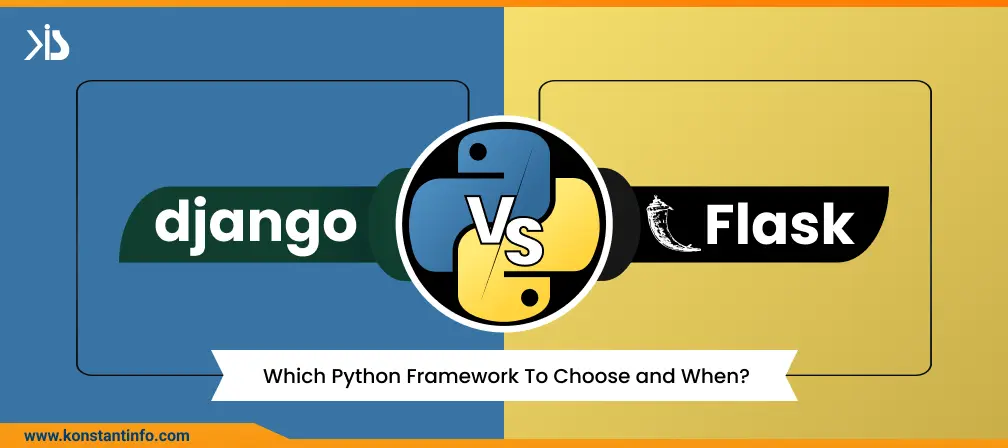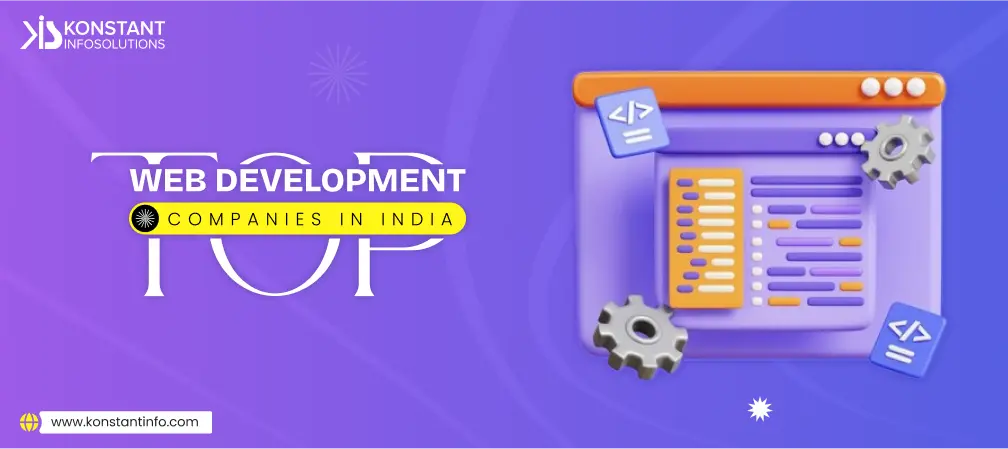
Python is a source for developing websites and software and does task automation, data visualization, and data analysis. Undeniably, python can build incredible web applications. When we talk about Python Frameworks, Django and Flask frameworks play significant roles. These two frameworks are key to building robust websites and applications; therefore it is important to decide which is the right one to use.
In this blog, we will delve into the discussion on Django and Flask Frameworks. The demonstration will explain what the frameworks are, their features, their pros & cons, which one to choose, and when to use. The blog is a sufficient guide for the readers to let them know which one to choose for their work purpose. So let’s get started.
Table of Contents
Django is an open-source Python-based framework for designing agile web application development.
Key Companies using Django: Instagram, Mozilla, Udemy, Zapier, Spotify, National Geographic, Pinterest
Flask is considered a micro-framework because there is no dependence on external libraries to perform certain tasks of the framework.
Companies using Flask: Airbnb, Netflix, Reddit, Mozilla, Zillow
No wonder, Django and Flask both are useful for developing seamless web applications. Still, there are some differences you need to understand:
| Parameters | Django | Flask |
|---|---|---|
| Type of Framework | Django is considered a full-stack framework enabling ready-to-use solutions with in-built battery usage for a better approach. | Flask is lightweight and provides plenty with no libraries and minimal to minimal features. |
| Data Modeling / Working of Framework | Django provides an object-oriented approach that allows for object-relational mapping (the connecting of databases and tables with classes). | Flask employs a modular design, which enables the use of third-party libraries and extensions. |
| Project Layout | Multiple-page applications suit Django. | Flask can work with single-page applications. |
| Flexibility | Django is very flexible because there are some in-built features and tools exist. Developers cannot change the modules in it. | It is a microframework system having extensible libraries, which makes Flask a good and flexible framework to use for developers. |
| Control | Developers are unable to control or alter the modules and functions due to their in-built libraries. | When the developers use Flask, they have full control over the application development without the dependencies of external libraries. |
| Structure | Django has a better and smoother structure with convention. | The framework of Flask is a bit random. |
| Usage | Django is perfect to use for end-to-end technologies and large companies; such as Udemy & Instagram. | Flask can go best with the companies, that believe in experiments with their modules; such as Netflix & AirBnb. |
| GITHub Stars | 55.6K | 53.9K |
| Architecture | It works on the basis of MVT architecture, segregated into 3 parts (model, template, and view.) | It is a kind of minimalistic framework that provides developers flexibility during application structuring. |
| Speed of Development | Django allows us to build apps as soon as possible, but it is slower compared to Flask. | Flask is quicker than Django because of some abstraction layers. |
| Maturity | It was launched in the year 2005, which is a mature framework with extensive support and communal management. | Flask launched in 2010, known as the younger framework, has a large community. |
| API Support | Django does not support APIs. | Flask supports APIs. |
| Working Style | Django is a sort of monolithic framework. | Flask has a diversified working style. |
| Template Design | Django is the one framework, which is designed by Ninja2. At the same time, there is an in-built model to make the development easier. | Flask works on Ninja2 Template Design. |
| Debugger | Django does not support any debugging virtually. | Flask itself has an in-built debugger, which is why it supports virtual debugging. |
| Best Features |
|
|
| HTML | Django supports extensive HTML Pages. | On the other hand, flask does not support dynamic HTML pages. |
You cannot claim one Python framework as the best one until you are aware of all the pros and cons. So here are some pros and cons of Django we are about to discuss:
| Pros | Cons |
|---|---|
| Full-Stack Framework | Not Suitable for Small and Short-Term Projects |
| Batteries-Included Concept | It is harder to master with Django and a bit complex to use during development |
| Highly Scalable | There is a lack of conventions |
| Comprehensive Documentations | Monolithic Work Environment |
| SEO-Friendly | Limited Design Options and Components |
| Cross-Platform Compatibility | Cannot handle multiple requests simultaneously |
| High-Level Security | |
| Rapid Development and Fast Processing | |
| Excellent CDN Management |
| Pros | Cons |
|---|---|
| It is flexible and developers have full control and access | There is no support for multi-page apps |
| Good web framework for smaller and short-term projects | Flask has a lack of security features |
| It is extensible | There is no built-in admin site |
| It is easier and quicker to build up the prototypes | It is difficult to maintain |
| Flask leads to scalability | Developers need to use extensions for object-relational mapping. |
| Flask is easier to route through Werkzeug | |
| It allows the developers to experiment. |
It is important to know when to use Django; so read the points to know where Django can be used:
If you are confused about when to use Flask Framework; read to know its use cases:
Flask vs Django; which is the right Python Framework to Choose? The question is striking in everyone’s head. By the way, all the web app ideas require Django and Flask according to the requirements of web app development. Still to know which one is better; you need to know better about both frameworks.
Django is a full-stack framework. On the other hand, Flask is one micro-level and lightweight Python framework. There is not one framework one can choose and claim to be perfect, because both frameworks are good to go at certain states and requirements.
When it comes to choosing one Python framework for their project, make sure you first evaluate your own needs, requirements, and goals. Evaluating own preferences will help to find the right framework to use.
Django is more sophisticated and result-oriented to build incredible web apps. So choosing Django is more beneficial with its wrestling framework features and functionalities.
In case you have any confusion; then connect with Konstant InfoSolutions. Here you will meet prominent IT Experts, who will tell you about the best possible solutions. Additionally, the experts are available for development
Flask is much easier with a simpler curve to navigate.
First, your requirements and web app type will help to select the appropriate Python framework. Considering here one to choose; rather prefer to opt for Flask. It is easier to learn and experimental to try new things.
In Django, there are in-built libraries that do not allow the developers to have control of the modules. Moreover, it is not customizable functioning. On the other hand, developers who use Flask have all-over control over the application development without the use of external libraries. Additionally, Django does not provide support for virtual debugging.



Manish Jain is the co-founder and Managing Director at Konstant Infosolutions. He is responsible for the overall operations of the company and has played a major role in bringing Konstant up from its humble beginnings and, with his immense energy and drive, transforming it into a globally trusted name in IT solutions.
Or send us an email at: [email protected]